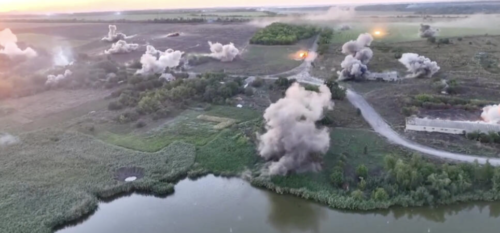On August 6, Ukrainian troops streamed across the border into the Russian region of Kursk: the first major change to the frontlines in months. The counteroffensive was an impressive demonstration of modern combined-arms warfare. Alongside armored units came air-defense systems, drones and infantry. The Russian garrison in the region was caught by surprise– only recently has their situation stabilized.
The Kursk offensive dovetails with Ukraine’s recently proposed plan to end the war. By taking a chunk of Russian territory, Ukraine has strengthened its bargaining position in any future negotiations. However, the Russians have so far held fast. They have managed to continue their offensive in the southern Donbass region even as the lines in Kursk have ossified. They have largely done so by virtue of mass, not operational ingenuity. In the hotly contested area around the Ukrainian railway hub of Pokrovsk, Ukrainians claim that Russia is taking six casualties for every Ukrainian one. Still they advance, using illegal weapons like tear gas. It is a medieval approach that betrays Putin’s lack of consideration for the sanctity of human life.
So far, Ukraine has held out through Western military assistance ingenuity and ingenuity. This is demonstrated by the September 21 attack on a Russian ammunition dump in Toropets, 300 miles from the Ukrainian border, in which Ukrainian-made drone systems took Russian air defenses by surprise. But Western aid has come in half-measures. The latest stumbling block is the use of American long-range weapons in Ukraine, which a typically-bellicose Putin describes as a red line. The West should not be cowed by Putin’s hollow threats. He is betting that he can hold up aid to Ukraine for long enough to seal his edge in the Donbass.
NATO should work to disavow Putin of the notion that he can outlast Ukraine — not only by fulfilling President Zelensky’s urgent request to use long-range weapons but by acting preemptively for the first time in the conflict and sending weapons that could substantially degrade Russia’s strategic advantage. For instance, advanced electronic-warfare equipment is among the most-sensitive in the Western arsenal: its use in Ukraine has been strictly prohibited. This is a profoundly foolish policy. What makes Ukraine, a nation whose survival hinges on its ability to stay on the West’s good side, more likely to reveal defense secrets than, say, Hungary and Viktor Orbán?
The West should also provide Ukraine with more economic support.This needn’t cost taxpayers a dime. Over $300 billion of Russian assets are frozen by the West. The interest on these investments is already being channeled to Ukraine — but the bulk of the cash should be as well. The West worries about setting a precedent in which its assets could be similarly seized by Russia or China. That is possible. But the enemies of democracy are far more reliant on the American financial system than the West is on Russian or Chinese ones. That is an advantage worth pressing.
These proposals are feasible on paper, but may be politically untenable. In the U.S., lawmakers dovish on Russia have been loath to provide Ukraine with the cash and supplies that it needs to win, and accuse Zelensky of preying on the U.S.’s generosity. This attitude ignores the reciprocal nature of U.S. relations with Ukraine. The conflict has provided insights into the warfighting capabilities of a sophisticated adversary like Russia, reenergized the Western military base, pushed two new members into NATO and advanced drone and cyber technologies.
It is also notable that many of those reluctant to put further pressure on Russia, like the vice-presidential candidate J.D. Vance, are also fierce opponents of China, Iran and North Korea. This duality of attitudes ignores the ever-increasing degree of collaboration between those four countries. North Korea and Iran (as well as, in all likelihood, China) have sold Russia missiles, artillery shells, jet engines and drones. In return, they may well have demanded Russian technology in areas like ballistic missiles and nuclear warfare. Quashing the Putin regime, then, will also deal a significant blow to America’s other adversaries. Zelensky needs to convince his counterparts in the West that this is their fight, too.






